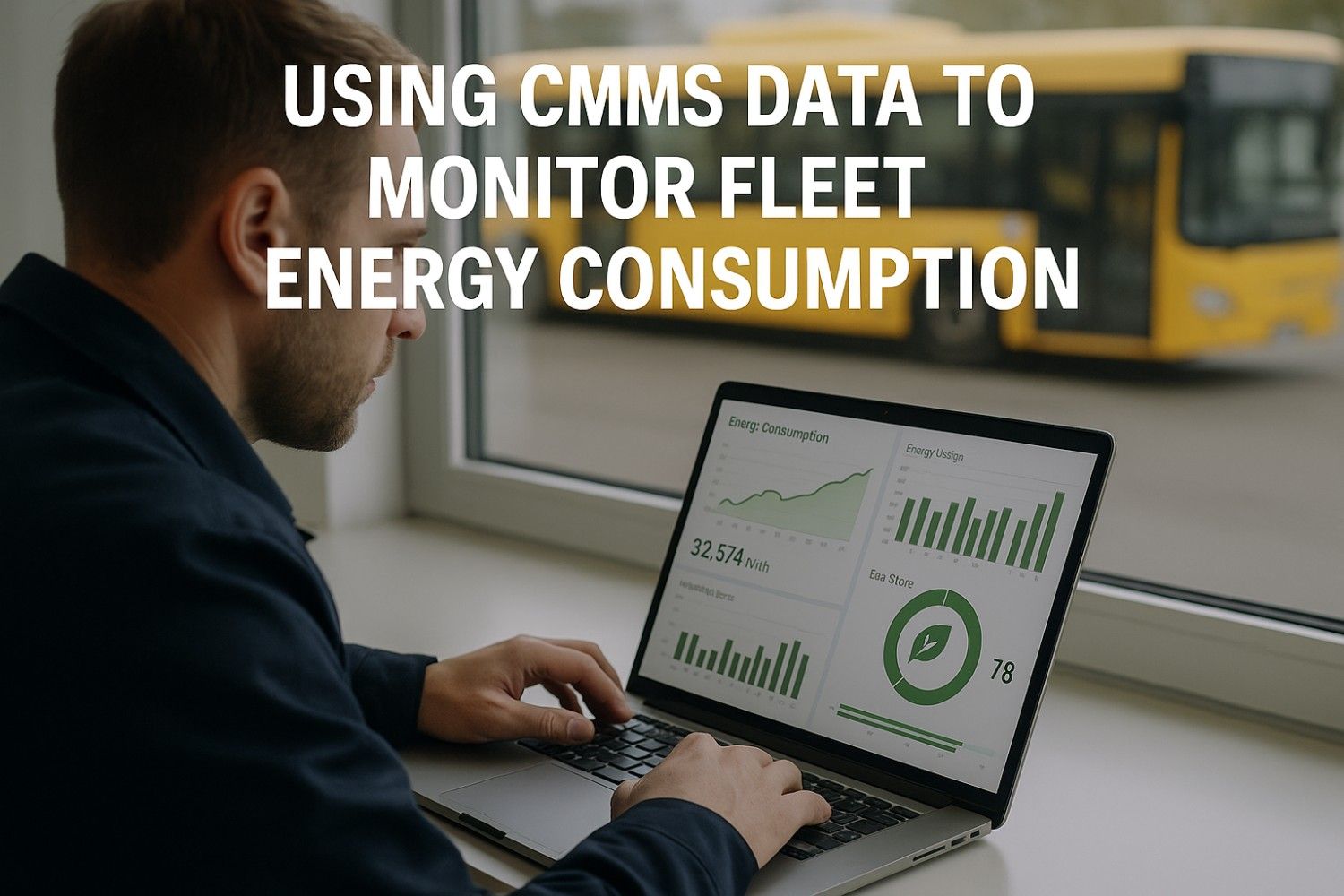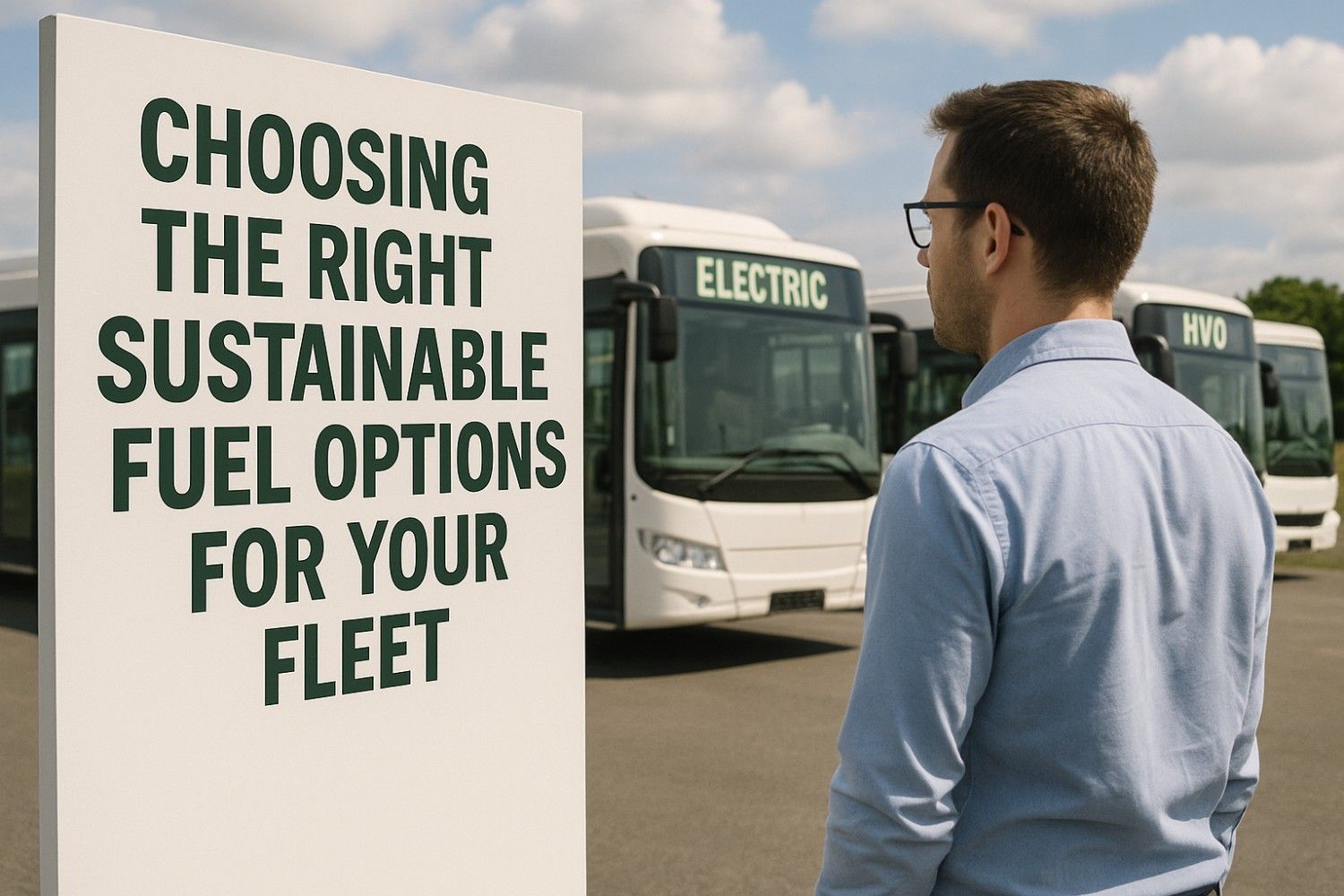Data-driven energy management transforms bus fleet operations from reactive cost centers into proactive efficiency leaders. Modern Bus CMMS platforms collect, analyze, and visualize energy consumption data across every vehicle, route, and operational parameter, enabling fleet managers to identify waste, optimize performance, and dramatically reduce costs. This comprehensive visibility into energy usage patterns empowers decision-makers with actionable insights that drive measurable improvements while supporting sustainability commitments and regulatory compliance requirements.
Traditional fleet management approaches lack the granular energy monitoring capabilities necessary to identify inefficiencies and optimization opportunities. Without detailed consumption tracking, fleet operators cannot determine which vehicles waste fuel, which routes create excessive energy demands, which maintenance practices improve efficiency, or which operational changes deliver the greatest cost reductions. This data blindness prevents strategic decision-making and allows thousands of dollars in preventable energy waste to accumulate daily across fleet operations.
Fleet operators leveraging Bus CMMS data analytics report transformative results: 22% reduction in overall energy consumption, 35% improvement in identifying inefficient vehicles, 40% faster detection of maintenance issues affecting efficiency, and 50% better accuracy in energy budget forecasting. These data-driven approaches deliver average annual savings of $180,000-$450,000 for 100-bus fleets while providing the documentation necessary for sustainability reporting, grant applications, and environmental compliance demonstrations.
Unlock Your Fleet's Energy Data Potential
Start monitoring and optimizing your fleet's energy consumption with powerful CMMS analytics that transform raw data into actionable cost savings.
Start Monitoring Energy NowSee Energy Analytics Demo
Comprehensive Energy Data Collection
Effective energy monitoring begins with comprehensive data collection across all energy consumption sources. Bus CMMS platforms integrate with vehicle telematics systems, fuel management systems, charging infrastructure, and maintenance records to create complete energy consumption profiles for every vehicle and route.Implement comprehensive energy tracking that captures every gallon of fuel and kilowatt-hour of electricity your fleet consumes.
Critical Energy Data Sources
Fuel consumption tracking extends beyond simple gallons-per-mile calculations to include detailed analysis of consumption patterns by route, driver, time of day, weather conditions, and vehicle load. Advanced Bus CMMS platforms correlate fuel usage with operational parameters to identify specific factors driving consumption, enabling targeted interventions that address root causes rather than symptoms of inefficiency.
Electric vehicle energy monitoring tracks charging session data including electricity consumption, charging duration, power delivery rates, and battery state of charge throughout operations. This granular visibility reveals charging inefficiencies, battery degradation patterns, and opportunities for optimizing charging schedules to minimize costs while extending battery lifecycles. Explore EV energy monitoring features that maximize range and minimize charging costs.
Integrated Data Collection Points
- Telematics Integration: Real-time vehicle data including speed, acceleration, braking, idling, and GPS location for comprehensive operational analysis
- Fuel Management Systems: Automated fuel transaction recording with vehicle identification, volume, cost, and fueling location tracking
- Charging Infrastructure: Electric vehicle charging data including session timing, electricity consumption, demand charges, and charging rates
- Maintenance Records: Component service history correlated with energy efficiency metrics to quantify maintenance impact
- Route Information: Distance, elevation, stop frequency, and traffic patterns affecting energy consumption
Real-Time Energy Monitoring and Alerts
Critical Energy Alert Configurations
- Consumption Anomalies: Immediate alerts when vehicles exceed normal energy usage patterns indicating developing problems
- Efficiency Degradation: Notifications when fuel economy or electric range declines beyond acceptable thresholds
- Excessive Idling: Alerts for prolonged engine idling events wasting fuel without productive operation
- Peak Demand Events: Warnings when electric charging approaches costly utility demand thresholds
Real-time monitoring enables immediate intervention when energy waste occurs, preventing minor inefficiencies from escalating into major cost drains. Bus CMMS platforms continuously analyze consumption data against established baselines, triggering automated alerts when deviations indicate problems requiring attention. This proactive approach catches issues within hours rather than weeks, minimizing cumulative waste and enabling rapid corrective action.
Configurable alert thresholds account for operational variations including seasonal changes, route modifications, and vehicle assignments, preventing false alarms while ensuring genuine efficiency problems receive immediate attention. Set up intelligent energy alerts that notify the right people at the right time with actionable information for rapid problem resolution.
Vehicle-Level Energy Performance Analysis
Individual vehicle performance analysis identifies specific units operating inefficiently, enabling targeted maintenance interventions that restore optimal energy consumption. Bus CMMS platforms compare each vehicle's energy usage against fleet averages and historical performance baselines, highlighting outliers requiring investigation and documenting improvements following maintenance activities.
Performance Benchmarking and Comparison
Peer Vehicle Comparison
Compare similar vehicles operating identical routes to identify outliers consuming excessive energy despite comparable operating conditions
Historical Trending
Track each vehicle's efficiency over time to detect gradual degradation indicating maintenance needs before major problems develop
Fleet-Wide Rankings
Rank all vehicles by efficiency metrics to prioritize maintenance resources on worst performers delivering maximum improvement potential
Detailed vehicle energy profiles reveal specific operating characteristics affecting consumption including acceleration patterns, braking behavior, speed management, and idle time. This granular analysis distinguishes between vehicle mechanical issues requiring maintenance and driver behavior problems needing training interventions. Schedule a demo to see vehicle energy profiling that pinpoints exactly where your fleet is wasting money.
Route-Based Energy Consumption Analysis
Route characteristics significantly impact energy consumption, with identical vehicles operating different routes showing dramatically different efficiency metrics. Bus CMMS platforms analyze consumption patterns by route, identifying high-energy routes requiring optimization and quantifying the impact of route modifications on overall fleet efficiency.
Route Energy Profiling
- Elevation Analysis: Quantify energy impact of grade changes and identify opportunities for route modifications reducing climbing requirements
- Stop Frequency Impact: Measure energy consumption related to acceleration cycles and identify optimal stop spacing for efficiency
- Traffic Pattern Correlation: Analyze how congestion affects energy usage and optimize scheduling to avoid high-consumption periods
- Distance vs. Consumption: Calculate actual energy costs per route mile accounting for all operational factors beyond simple distance
Route optimization recommendations generated by Bus CMMS analytics balance service requirements with energy efficiency considerations, suggesting modifications that maintain coverage while reducing consumption. These data-driven route improvements typically deliver 8-15% energy savings without compromising service quality or coverage areas. Start optimizing your routes with energy data that quantifies the real cost of every stop and turn.
Driver Behavior Impact on Energy Consumption
Driver behavior represents one of the largest controllable factors in fleet energy consumption, with individual driving styles creating 15-30% variation in fuel economy and electric range for identical vehicles on similar routes. Bus CMMS platforms track driver-specific energy metrics, identify high-consumption behaviors, and provide coaching feedback that improves efficiency across entire driver populations.
Driver Performance Metrics
Acceleration aggressiveness directly impacts energy consumption, with harsh acceleration burning excessive fuel while wearing brake components and reducing passenger comfort. Bus CMMS analytics quantify each driver's acceleration patterns, identifying operators requiring coaching while recognizing efficient drivers as models for best practices. This objective performance data enables fair, effective training programs that improve fleet-wide efficiency.
Idle time management varies significantly between drivers, with some operators minimizing unnecessary idling while others allow engines to run excessively during breaks, layovers, and delays. Detailed idle time tracking by driver reveals training opportunities and enables recognition programs rewarding efficient behavior. Explore driver energy scorecards that transform behavior through visibility and accountability.
Behavioral Energy Factors
- Speed Management: Consistent, moderate speeds optimize efficiency compared to aggressive speed variations and excessive velocity
- Braking Patterns: Smooth deceleration maximizes regenerative braking recovery while harsh braking wastes energy as heat
- Route Familiarity: Experienced drivers anticipate conditions better, enabling more efficient speed and braking management
- HVAC Usage: Appropriate climate control settings balance passenger comfort with energy conservation objectives
Maintenance Impact on Energy Efficiency
Maintenance practices directly influence energy consumption, with properly maintained vehicles consuming significantly less energy than neglected units. Bus CMMS platforms correlate maintenance activities with energy performance changes, quantifying the efficiency impact of specific repairs and preventive maintenance procedures. Track maintenance-driven efficiency improvements that justify proactive service investments through documented energy savings.
Quantifying Maintenance ROI Through Energy Data
Maintenance Activities with Measurable Energy Impact
- Engine Tuning: Properly tuned engines show immediate 5-10% fuel consumption improvements measurable within days of service
- Tire Replacement: New tires with proper rolling resistance reduce consumption by 3-5% compared to worn tires
- Air Filter Changes: Clean filters improve airflow and combustion efficiency, reducing fuel consumption by 2-4%
- Wheel Alignment: Correct alignment eliminates drag, improving efficiency by 2-3% while extending tire life
Before-and-after energy analysis demonstrates maintenance value through objective performance data, supporting budget requests for preventive maintenance programs by documenting tangible cost savings. This evidence-based approach transforms maintenance from a necessary expense into a profit-generating investment that pays for itself through reduced energy consumption.
Energy Cost Analysis and Budgeting
Accurate energy cost forecasting requires detailed consumption analysis combined with rate structures, seasonal variations, and operational changes. Bus CMMS platforms integrate historical consumption data with current pricing to generate precise budget projections, while scenario analysis tools evaluate the financial impact of operational modifications before implementation.
Comprehensive Cost Tracking
Fuel price volatility creates budgeting challenges without detailed consumption tracking and forecasting capabilities. Bus CMMS platforms separate consumption volume from price fluctuations, enabling fleet managers to distinguish between cost changes resulting from consumption variations versus market price movements. This clarity supports accurate budget projections and identifies opportunities for consumption reduction even during stable price periods. See budget forecasting tools that predict energy costs with unprecedented accuracy.
Electric vehicle energy costs involve complex rate structures including time-of-use pricing, demand charges, and seasonal variations that simple per-mile calculations cannot capture accurately. Advanced CMMS analytics model these multifaceted pricing structures, calculating true energy costs per vehicle, route, and service hour while identifying optimization opportunities that minimize expensive peak-rate consumption and demand charge exposure.
Sustainability Reporting and Carbon Tracking
Environmental sustainability initiatives require detailed energy consumption documentation and carbon emissions calculations. Bus CMMS platforms automatically compile sustainability metrics from operational data, generating comprehensive reports that demonstrate environmental impact, support grant applications, and document progress toward emissions reduction goals.
Carbon Footprint Quantification
- Emissions Calculations: Convert fuel consumption and electricity usage into standardized carbon dioxide equivalent metrics for reporting
- Reduction Tracking: Document year-over-year emissions decreases resulting from efficiency improvements and fleet electrification
- Comparative Analysis: Benchmark fleet emissions against industry standards and similar operators to demonstrate leadership
- Project Impact Assessment: Quantify carbon benefits from specific initiatives including vehicle replacements and route optimizations
Automated sustainability reporting eliminates manual data compilation while ensuring accuracy and consistency across reporting periods. Bus CMMS platforms generate professional reports suitable for board presentations, grant applications, public relations materials, and regulatory compliance submissions. Automate your sustainability reporting and demonstrate your environmental commitment with verifiable data.
Predictive Analytics for Energy Optimization
Machine learning algorithms analyze historical energy data to predict future consumption patterns, identify optimization opportunities, and recommend specific actions that reduce costs. Bus CMMS platforms leverage artificial intelligence to detect subtle patterns human analysis might miss, generating insights that drive continuous efficiency improvements across all fleet operations.
Advanced Predictive Capabilities
Seasonal consumption forecasting accounts for weather impacts, holiday scheduling, and ridership variations that affect energy requirements throughout the year. Accurate predictions enable proactive resource planning, budget adjustments, and operational modifications that optimize efficiency during high-consumption periods while preventing over-preparation during low-demand seasons.
Vehicle replacement ROI analysis uses energy consumption trends to identify aging vehicles where declining efficiency justifies early replacement despite remaining service life. This data-driven approach to fleet renewal prioritizes vehicles where new technology delivers maximum energy savings, accelerating payback periods while maintaining capital budget discipline. Explore predictive analytics features that forecast energy consumption and recommend optimization strategies.
Benchmarking and Performance Goals
Objective performance benchmarks enable meaningful efficiency goals and track progress toward energy reduction targets. Bus CMMS platforms establish baseline consumption metrics, set improvement objectives, and monitor achievement through comprehensive dashboards that visualize progress and identify areas requiring additional attention.
Strategic Goal Setting
Industry benchmark comparisons place fleet performance in context, revealing whether current consumption levels represent best practices or indicate opportunities for substantial improvement. Bus CMMS platforms incorporate industry data to establish realistic yet ambitious targets that drive continuous improvement while recognizing genuine operational constraints and differences. Set data-driven energy goals based on your fleet's unique characteristics and improvement potential.
Departmental performance metrics create accountability and recognition programs that motivate teams to pursue efficiency improvements. Transparent goal tracking enables operators, maintenance staff, and management to understand their role in fleet energy consumption and take ownership of reduction initiatives that benefit organizational objectives.
Integration with Financial Systems
Energy cost integration with enterprise financial systems provides comprehensive visibility into operational expenses and enables sophisticated cost allocation, budgeting, and financial analysis. Bus CMMS platforms export detailed energy consumption and cost data to accounting systems, ensuring accurate department charging, grant reporting, and financial forecasting.
Financial Data Integration
Cost Center Allocation
Assign energy costs to specific routes, services, or departments for accurate budget management and financial accountability
Grant Compliance Reporting
Generate detailed energy consumption reports meeting specific grant requirements and documentation standards
Budget Variance Analysis
Compare actual energy costs against budgets to identify variances and adjust forecasts based on real consumption data
Mobile Access and Real-Time Visibility
Mobile CMMS applications provide drivers, supervisors, and managers with real-time energy consumption data, enabling immediate awareness and rapid response to efficiency issues. This distributed visibility ensures everyone understands their impact on fleet energy consumption and can make informed decisions supporting organizational efficiency objectives.
Mobile Energy Monitoring Features
Driver energy scorecards accessible through mobile devices provide immediate feedback on performance, creating awareness that drives behavioral improvements. Real-time consumption data enables drivers to see how specific actions affect efficiency, reinforcing training messages through objective evidence and encouraging adoption of fuel-saving techniques.
Supervisor dashboards on mobile devices enable field management to monitor energy consumption across assigned routes and vehicles, identifying problems requiring immediate intervention while recognizing exceptional performance deserving acknowledgment. This mobile visibility transforms energy management from a back-office function into a field-level priority. Deploy mobile energy monitoring that puts critical data in everyone's hands.
Continuous Improvement Through Data Analysis
Sustained energy efficiency requires ongoing analysis and optimization based on evolving operational conditions, technology advancements, and organizational changes. Bus CMMS platforms support continuous improvement programs through regular performance reviews, trend analysis, and recommendation engines that identify new optimization opportunities as they emerge.
Improvement Program Management
Energy efficiency initiatives require tracking from concept through implementation and results measurement. Bus CMMS platforms document improvement projects including baseline metrics, action plans, implementation status, and achieved savings, creating institutional knowledge that guides future initiatives while demonstrating program value to stakeholders and funding agencies. Learn how to build a continuous improvement culture driven by energy data and measurable results.
Best practice identification through fleet-wide analysis reveals which vehicles, routes, drivers, and operational approaches deliver superior efficiency. Systematic documentation and dissemination of these best practices accelerate improvement adoption across entire fleets, enabling all operations to benefit from innovations and discoveries occurring in any part of the organization.
Frequently Asked Questions
How does Bus CMMS enable comprehensive fleet energy monitoring and analysis?
Bus CMMS transforms energy management through comprehensive data collection, intelligent analysis, and actionable insights delivered through intuitive dashboards and reports. The platform integrates with vehicle telematics systems, fuel management infrastructure, electric charging stations, and maintenance records to capture complete energy consumption data across every operational parameter. Real-time monitoring tracks fuel usage and electricity consumption at the vehicle level, correlating energy metrics with route characteristics, driver behavior, weather conditions, and maintenance history to identify specific factors driving consumption. Automated alerts notify fleet managers immediately when vehicles exceed normal energy usage thresholds, enabling rapid investigation and corrective action before minor inefficiencies escalate into major cost drains. Advanced analytics compare individual vehicle performance against fleet averages and historical baselines, highlighting outliers requiring attention while quantifying improvements following maintenance interventions. Route-based analysis identifies high-consumption routes requiring optimization, while driver scorecards reveal behavioral factors affecting efficiency and guide targeted training programs. The platform generates comprehensive sustainability reports documenting carbon emissions, tracking reduction progress, and supporting grant applications with verifiable consumption data. Start monitoring your fleet's energy consumption with powerful analytics that turn raw data into cost savings averaging $180,000-$450,000 annually for 100-bus fleets.
What specific energy metrics should fleet operators track using Bus CMMS data?
Effective energy monitoring through Bus CMMS requires tracking comprehensive metrics across multiple dimensions to identify optimization opportunities and measure improvement progress. Fuel economy metrics including miles per gallon, gallons per hour, and cost per mile provide baseline consumption measurements while trending analysis reveals gradual efficiency degradation indicating maintenance needs. Electric vehicle range per charge, kilowatt-hours per mile, and charging efficiency percentages quantify EV performance while battery state of health measurements predict degradation and replacement timing. Idle time tracking by vehicle and driver identifies unnecessary engine operation wasting fuel without productive work, with industry-leading fleets maintaining idle time below 5% of total operating hours. Route-specific consumption metrics including energy per passenger mile and cost per route operation enable service planning decisions balancing coverage with efficiency objectives. Driver performance metrics such as harsh acceleration frequency, excessive speed events, and optimal speed maintenance percentage identify behavioral factors affecting consumption and guide training priorities. Maintenance impact analysis tracking energy consumption changes following service activities quantifies preventive maintenance ROI and justifies proactive service investments through documented savings. Schedule a consultation to identify the most valuable energy metrics for your specific fleet operations and learn how Bus CMMS delivers 22% average consumption reductions through data-driven optimization.
Conclusion
Energy consumption monitoring through Bus CMMS platforms transforms fleet operations from reactive cost management into proactive efficiency optimization. Comprehensive data collection, intelligent analysis, and actionable insights enable fleet managers to identify waste, implement targeted improvements, and achieve measurable cost reductions while supporting sustainability commitments and operational excellence.
The documented benefits—22% reduction in overall energy consumption, 35% improvement in identifying inefficient vehicles, and annual savings of $180,000-$450,000 for 100-bus fleets—demonstrate how data-driven approaches deliver superior results compared to traditional management methods. These improvements extend beyond direct cost savings to include enhanced sustainability reporting, improved budget accuracy, and competitive advantages through operational efficiency leadership.
As energy costs continue rising and environmental accountability intensifies, fleet operators implementing comprehensive energy monitoring through advanced Bus CMMS solutions position themselves for long-term success. The technology exists today to capture, analyze, and act upon detailed energy consumption data, creating operations that maximize efficiency, minimize costs, and demonstrate environmental stewardship through verifiable results.
Start Making Data-Driven Energy Decisions Today
Discover how Bus CMMS energy monitoring capabilities can transform your fleet's efficiency and deliver substantial cost savings starting immediately.







